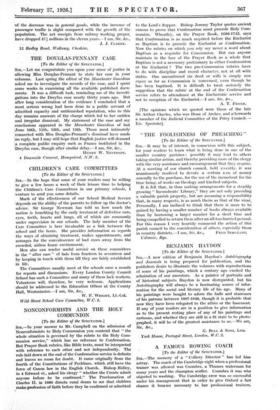NONCONFORMISTS AND THE HOLY COMMUNION
[To the Editor of the SPECTATOR.]
Sia,—In your answer to Mr. Campbell on the admission of Nonconformists to Holy Communion you contend that " the whole situation is governed by the rubric to the Holy Com- munion service," which has no reference to Confirmation. But Prayer Book rubrics, like Bible texts, must be interpreted with reference to each other and not independently. The rule laid down at the end of the Confirmation service is definite and leaves no room for doubt. It came originally from the fourth of the Constitutions of Peckham, which still have the force of Canon law in the. English Church. Bishop Ridley, in 4 Edward vi., asked his clergy " whether the Curate admit anyone before he 'be confirmed." The Proclamation of Charles II. in 1660 directs rural deans to see that children make profession of faith before they be confirmed or admitted
to the Lord's Supper. Bishop Jeremy Taylor quotes ancient canons to prove that Confirmation must precede Holy Com- munion. Wheatley, on the Prayer Book, 1686-1742, says that Confirmation is as much required before the Eucharist as Baptism is to precede the Eucharist or .Confirmation. Now the rubrics on which you rely say never a word about Baptism as a requisite for Communion. But can anyone maintain in the face of the Prayer Book as a whole that Baptism is not a necessary preliminary to either Confirmation or the Eucharist ? The two pre-Communion rubrics have to do with discipline and moral character, not at all with status. One unconfirmed (in deed or will) is simply non capax so far as Communion is concerned, even though he has been baptized. It is difficult to treat seriously the suggestion that the rubric at the end of the Confirmation service refers to attendance at the Eucharistic service and not to reception of the Eucharist.—I am, Sir, &c.,
A. T. FRYER.
[The opinions which we quoted were those of the late Sir Arthur Charles, who was Dean of Arches, and afterwards a member of the Judicial Committee of the Privy Council.— En. Spectator].






















































 Previous page
Previous page